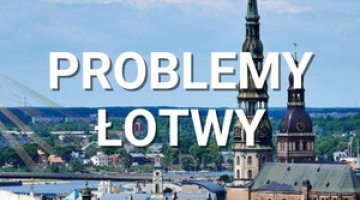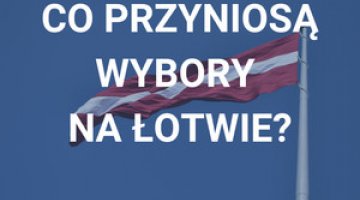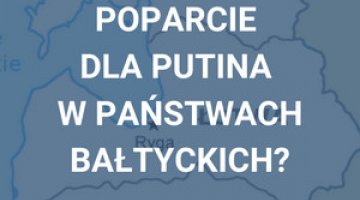Election in Latvia overshadowed by ethnic divides
There were no radical changes in the makeup of Latvia’s Saeima following the parliamentary election on 4 October. The opposition left-wing pro-Russian party Harmony were the most popular grouping. They have entered parliament with no major changes in the number of seats they previously had, as did the centre-right coalition which governed the country before the election. The centre-right coalition stands the greatest chance of forming the government again. The probable new cabinet will be led by Laimdota Straujuma, the previous prime minister; and this means that Latvia’s pro-Euro-Atlantic policy will be continued.
The outcome of the election has proven that ethnic Latvians share the concern of the centre-right government coalition that Russia could make efforts to destabilise Latvia – mainly by using pro-Russian forces and the Russian minority – and do not want any changes in the country’s policy even though they are dissatisfied with the achievements of the previous centre-right government. In its latest campaign, Harmony relinquished its image of a party seeking reconciliation between ethnic Latvians and the Russian-speaking minority. At present, it is an openly pro-Russian party. It no longer conceals its political alliance with United Russia, which is a pro-Kremlin party, and it is standing more and more firmly for the rights of the Russian minority, including granting the status of second official language to Russian. According to Latvia’s centre-right parties, if this grouping took power in the present geopolitical situation, this could pose a threat to the country’s security.
The conflict between two political visions: maintaining the pro-Euro-Atlantic policy on the one hand and decreasing criticism of the Kremlin and developing economic co-operation with Russia on the other was the core of the election campaign. This is widening the political and ethnic divides among the residents of Latvia.
The election results
The Social Democratic Party Harmony received the largest share of the vote in the recent parliamentary election in Latvia. This was the first time when it acted as an independent entity – previously it was part of a coalition of groupings representing the interests of the Russian-speaking population called Harmony Centre. The party is led by Nil Ushakov, the mayor of Riga. He is an ethnic Russian. Harmony will have 24 out of the 100 seats in Latvia’s parliament; Harmony Centre won 7 seats more in the previous election in 2011 (see Appendix). The next most popular groupings were the three centre-right parties which had thus far formed the government coalition: Unity, who Prime Minister Laimdota Straujuma belongs to, won 23 seats, the Union of Greens and Farmers won 21, and the National Alliance “All for Latvia!”–“For Fatherland and Freedom”/LNNK garnered 17 seats. In total, they will have 14 seats more than previously. Since the parties which formed the government coalition before the election will jointly have 61 votes, the president is likely to entrust Straujuma with the mission to form the new government. The coalition may gain 8 seats more if the new grouping, Latvian Association of Regions, decides to join it. Thus the representatives of the Russian-speaking minority will remain in opposition as before the election.
Solvita Aboltina, the leader of Unity (the coalition’s main grouping), who served as parliamentary speaker until recently, and a few other members of this party lost their seats. This came as the greatest electoral surprise and is also proof of the waning confidence in this party: although Unity has led Latvia through the economic crisis, it has failed to resolve the country’s other serious problems. In this election, Latvians showed that they do not want their country to adopt a more radical stance in the present international situation. One proof of this is the growing popularity of the Union of Greens and Farmers, which often wavers between the pro-Western option and co-operation with Russia.
The durable divide in Latvia
The parliament’s makeup reflects the ethnic and political divides existing in Latvia, which are deep and durable. So-called “Russian-speaking” people form 35% of Latvia’s population (26% are ethnic Russians). This group includes 13% of Latvia’s permanent residents (280,000 out of around 2 million of the country’s residents) who do not have Latvian citizenship and have no right to vote. These people have either failed or chosen not to undergo the naturalisation procedure because, for example, they are unable to pass the examination in Latvian. Most of them live in Latgale, a region which borders Russia and Belarus. Russian speakers account for almost 60% of the region’s population (over 70% in the region’s capital city, Daugavpils). Another major agglomeration of this minority – de facto a majority – is Riga, 55% of whose residents are speakers of Russian. The interests of the Russian-speaking population, even those who are not Latvian citizens, are represented by political parties whose members include both radical anti-Latvian politicians, such as MEP Tatiana Zhdanok, who constantly accuses Latvia of human rights violations, and those who advocate for minority rights, declare loyalty to the state and want co-operation with Latvian parties (Nil Ushakov). Russian organisations are supported (including financially speaking) by the Russian embassy, and are backed by the local Russian-language media, mainly newspapers and Internet portals, as well as Russian TV, which is available in Latvia.
The ethnic divide overlaps to a great extent with the political divide, namely the choice between the Western and the Eastern options. Latvia’s Russian-speaking residents and ethnic Latvians hold different views on the country’s Soviet past, which is officially recognised as occupation, and also on the present government’s policy, on which Russian speakers have hardly any influence despite their active participation in the country’s political life and even electoral victories (they are boycotted by Latvian groupings). The only tangible political success of the Russian minority was Ushakov’s victory in the election for mayor of Riga. Russian speakers were opposed to Latvia’s accession to Euro-Atlantic structures, they protested against the introduction of the euro, they resist the presence of NATO troops in Latvia, and only 8% of them condemn the recent Russian aggression against Ukraine.
The disillusionment of ethnic Latvians
Despite the broad and politically diversified representation in the Saeima, ethnic Latvians have for a long time seen a vast gap between the actions taken by the political elite and how voters’ interests are dealt with. The political system in Latvia is quite unstable. There are no traditional political parties which have existed since Latvia regained independence. Instead, new entities are constantly being formed, albeit often by the same politicians and in various political configurations. To a great extent government coalitions in the country are often formed to support the political interests of the leaders and their groupings and not based on the similarity of their agendas and shared visions for the development of the country. The frequent scandals and falls of government have been a manifestation of the bitter rivalry between oligarchs, the businessmen who built their fortunes owing to controlling the privatisation process in the early 1990s and then gaining hold of all areas in the state, including politics. As a consequence of widespread corruption and the unstable banking system –which Russian capital has a significant share in – Latvians have suffered especially strongly from the economic crisis of 2008. This has deepened their disillusionment with the political elite and has provoked mass protests against how the state is being appropriated by oligarchs and politicians who represent their interests. In 2011, Latvians dissolved parliament in a referendum, but the new parliament has failed to meet their expectations. The Reform Party, a new grouping which won the election owing to promises to combat corruption and the oligarchs, did not survive as an independent entity, and the centre-right coalition was forced to accept the grouping led by the oligarch Aivars Lembergs – the Union of Greens and Farmers – once again in order to maintain a stable majority.
Although, Latvia has become Europe’s fastest developing country following the economic crisis and the socially painful spending cuts and reforms, its economic growth has recently slowed down to 2.3% of GDP. Many residents of Latvia have chosen to emigrate: 21,000 of them have left Latvia since January 2013. According to estimates by Latvian experts (Latvian institutions are not monitoring this process fully), between 50,000 and 120,000 residents of Latvia (up to 5% of the productive age group), including a large group of Russian-speaking people, have left Latvia for good since it joined the EU in 2004.
Pro-Euro-Atlantic Unity opposes Russian influence
Russia’s military intervention in Ukraine and the increasing threat from Russia have contributed to a consolidation within the centre-right government coalition. This became focused on the need to enhance Latvia’s integration with the EU and NATO. Although Latvia is a member of the Euro-Atlantic structures, Russian capital is still dominant it its economy, and its influence is in many cases non-transparent. This has been clearly seen in particular in the banking sector – the Latvian bank supervision authorities have been criticised by international organisations for ineffectively combating the laundering of dirty money, as a consequence of which Latvia has become one of the major loops in the international transfer of illegal funds. Latvia has also been delaying reform the energy sector and curbing the dominance of Russian companies, such as Gazprom, unlike the Lithuanian and Estonian governments, for whom this has been a priority task for a long time now. The sense of threat from Russia is causing the grouping which forms the core of the coalition, Unity, to make attempts to catch up on these tasks. Straujuma’s government, with President Andris Berzins’s approval (his future re-election depends on support from the coalition) has backed an alliance with the USA. One manifestation of this are the government’s decisions to sell shares in two strategic entities to US companies: Citadele bank (which was formed following the collapse of the popular Parex bank, which was nationalised thus contributing to the destabilisation of Latvia’s budget in 2008) and Latvijas Gaze (gas distribution, gas grids and the only gas tank in the Baltic region); this was opposed by the opposition Harmony party. The government has also promised to spend more money on defence and wants a more intensive presence of NATO troops in the Baltic region.
The opportunities and threats for the pro-Russian option
Left-leaning voters and members of the Russian minorities could choose between two groupings this year: Harmony, which this time promoted itself not only as a minority party but also as a social democratic and left-wing alternative to the centre-right government (20% of the votes for this party were cast this year by ethnic Latvians), and a new party named For Latvia from the Heart. The latter party was formed in 2014 following the Riga supermarket catastrophe (Prime Minister Valdis Dombrovskis from Unity resigned due to this) by the former head of the Inspection Office, Inguna Sudraba. While Harmony does not hide its links with the pro-Kremlin party United Russia, in the case of Sudraba’s party there is only speculation that funds for its campaign originated in Russia and that she has private contacts with pro-Kremlin elites. Sudraba has also criticised the Latvian political elite for the preservation of the ethnic divide and its inability to build political co-operation based on common goals. Since this party entered parliament, Harmony, which has previously been deprived of potential coalition partners and has in fact been alienated, now may gain a coalition partner, and in the future might even form a parliamentary majority with the Union of Greens and Farmers, who are willing to co-operate with Sudraba, if the centre-right coalition disintegrates. At present, it appears impossible that the president could entrust Harmony with the mission of forming the government. For Ushakov, who has once again won the greatest number of seats and remains in opposition, this may mean that the Russian-speaking electorate will no longer be interested in supporting a grouping which wins elections but is unable to take power. In an attempt to retain voters’ support, Harmony might radicalise its manifesto further still and might thus have a destabilising effect on Latvia’s domestic politics (by exacerbating the conflict between the opposition and the government). If Harmony is yet again overlooked as a government coalition partner, this may provide another argument for the Kremlin’s propaganda that the voice of the Russian minority is suppressed in Latvia.
Joanna Hyndle-Hussein
Appendix
Election results
|
|
|||||||
|
Party |
Voter support (% in 2011) |
Number of seats (in 2011) |
Party profile |
||||
|
Social Democratic Party Harmony |
23% (28.36%) |
24 (31) |
Left-wing, pro-Russian, populist, representing the Russian minority’s interests |
||||
|
Unity |
21.87% (18.83%) |
23 (20) |
Centre-right, liberal, pro-Western; supports a market economy and Latvia’s enhanced integration with the EU and NATO structures |
||||
|
Union of Greens and Farmers |
19.53% (12.21%) |
21 (13) |
Centrist, combining two ideologies – a green party and a grouping representing farmers; supported and financed by the mayor of Ventspils, oligarch Aivars Lembergs |
||||
|
Alliance “All for Latvia!” – “For Fatherland and Freedom”/LNNK |
16.61% (13.88%) |
17 (14) |
Centre-right, conservative, an alliance of nationalist parties |
||||
|
For Latvia from the Heart |
6.85 (-) |
7 (-) |
A conservative and populist party, with opaque funding sources, established in 2014 |
||||
|
Latvian Association of Regions |
6.66 (-) |
8 (-) |
Centrist, formed by representatives of local Latvian parties and non-governmental organisations; established before the election to the European Parliament in 2014; it represents the interests of local communities |




